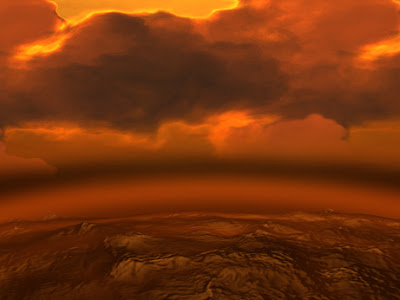
Venus, not Mars, may have been the most likely planet in the solar system to have also developed life, scientists say.
The cloud-shrouded planet most likely started with oceans much like Earth's, which evaporated as Venus heated up, according to new research.
The oceans didn't disappear overnight, said David Grinspoon of the Denver Museum of Nature and Science.
Speaking yesterday at a meeting of planetary scientists in Orlando, Florida, Grinspoon said that preliminary results of new computer models indicate Venus may have retained its oceans for a billion years after it formed, possibly longer.
Prior models had indicated that rising Venusian temperatures had turned the oceans to steam within the planet's first 600 million years.
The extra 400 million years are even more significant than they sound, Grinspoon added, because early Venus was constantly bombarded by asteroids, reducing the likelihood of life.
The new finding suggests that the oceans existed for much longer after the asteroid bombardment tapered off.
"There may have been a sizeable interval when [Venus] was habitable," he said.
Today, however, Venus is about 100,000 times drier than Earth and is 860º F (460º C) at its surface, Grinspoon said.
(Download a wallpaper photo of a Venusian volcano.)
The cloud-shrouded planet most likely started with oceans much like Earth's, which evaporated as Venus heated up, according to new research.
The oceans didn't disappear overnight, said David Grinspoon of the Denver Museum of Nature and Science.
Speaking yesterday at a meeting of planetary scientists in Orlando, Florida, Grinspoon said that preliminary results of new computer models indicate Venus may have retained its oceans for a billion years after it formed, possibly longer.
Prior models had indicated that rising Venusian temperatures had turned the oceans to steam within the planet's first 600 million years.
The extra 400 million years are even more significant than they sound, Grinspoon added, because early Venus was constantly bombarded by asteroids, reducing the likelihood of life.
The new finding suggests that the oceans existed for much longer after the asteroid bombardment tapered off.
"There may have been a sizeable interval when [Venus] was habitable," he said.
Today, however, Venus is about 100,000 times drier than Earth and is 860º F (460º C) at its surface, Grinspoon said.
(Download a wallpaper photo of a Venusian volcano.)











